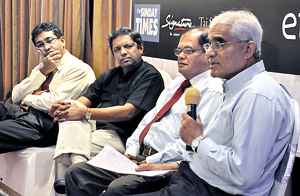Sri Lankan interest rates will increase quite a lot going forward, according to Dr. Indrajith Coomaraswamy, a former Director of Economic Affairs at the Commonwealth Secretariat and one-time senior staffer of the Central Bank and Sri Lanka’s Treasury.
He additionally noted that, as interest rates go up further, this will squeeze growth as interest rates hikes were anti growth measures. He also, instead, advocated adjusting the exchange rate which was more pro-growth oriented.
Dr. Coomaraswamy further went on to opine that a more balanced approach was needed in dealing with Sri Lanka's macroeconomic environment, especially in the medium- and long-terms, adding that eventually the exchange rate will have to depreciate. He also suggested that, as the country was now designated as lower middle income, a game changer, the cost of macroeconomic policy mistakes had become exponential so the policies of the past could not go on and instead there had to be a focus on export-led growth, with borrowing only as a last resort.
Dr. Coomaraswamy's comments were made during this week's Sunday Times Business Club panel discussion on the global financial crises and their impact on Sri Lanka, where he was joined by recently retired Central Bank of Sri Lanka (CBSL) Deputy Governor K.G. Dheerasinghe, and economist and MP Dr. Harsha de Silva.
 |
| Panellists. Pic by Amila Prabodha |
On the other hand, Mr. Dheerasinghe revealed that the country had surmounted a history of moderate growth to do quite well in 2010. He also pointed out that, despite the current balance of trade deficit, exports were at a 20-year high of 28%, with many increases in unconventional, new sectors such as ports, aviation, tourism, IT/BPO, etc., in addition to a balance of payments surplus of US$ 2.5 billion. .
He also noted that the trade gap was due to imports going up by 50% and that most of these (80%) were investment/development related and would benefit the economy while only 20% was consumption related. He also revealed that currently the Sri Lankan economy benefitted from five months import cover, with most considering three-and-a-half months of import cover to be good enough buffer.
Mr. Dheerasinghe also explained that the increase in interest rates was a measure to attract foreign investors into the Sri Lankan economy as, to sustain growth, investment had to increase by at least 30%. And this was not possible from domestic sources only. As such, the sovereign had to establish a benchmark on international markets which it did by offering instruments at higher interest rates.
Meanwhile, according to Dr. de Silva, those that say that these global financial crises could not affect Sri Lanka are wrong. He went on to add that not only would these crises affect the country but the effects would also be faster than those felt in 2008. This is because the Sri Lankan economy was more open to transmission factors, due to its added reliance on tourism, international trade, remittances, etc., compared to 2008.
Dr. de Silva also indicated that Sri Lanka could not hold both its exchange rates and its interest rates, and its current defence of the rupee, to the tune of US$ 2 billion to date out of a potential reserve of US$ 8 billion, would result in local borrowers being impacted "terribly" when they were paying back. He also added that, over the last 10 years, Sri Lankan exports had become a problem area, saying that exports to Gross Domestic Product (GDP) ratio had fallen from 30% to 17% over this timeframe. Further also revealing that the country's percentage of international exports had dropped from 0.12% to 0.06% over this span.
It was also Dr. de Silva's opinion that incentives be put in place to encourage local exporters or the economy would face more problems. He also pointed out that just focusing on foreign investors was not a good idea as there was no way to stop this money from exiting the economy quickly, as seen before.
Additionally, answering a question from the audience regarding the impact of future interest rates hikes on the local stock market, Dr. de Silva suggested that, while borrowing and lending was taking place, rising interest rates would hurt the stock market. He also revealed that the entire interest rate structure had gone up, a result of interest rates going up by a 100 basis points, which Sri Lanka's economy could not mitigate as shown by the country's trade balance worsening by 93%. He also added that this, paired with weak regulation in the stock market, which was opening it up to stock manipulators, could ultimately lead to a collapse.
Etisalat joins sponsorship of Sunday Times Business Club
Etisalat, the mobile phone service provider seen as number three in Sri Lanka, has joined the Sunday Times Business Club (STBC) as a key sponsor. At this week’s meeting of the STBC, the service provider explained to the audience (in a presentation) the new developments in IT and where the company is pitching its products, particularly with the use of androids.
Interestingly, the club began in around 1995 with Celtel (the country’s first mobile service provider) being its sponsor. Celtel, then transformed to Tigo and recently to Etisalat. “It’s like coming home. We all remember the ‘Gadol Baage (first mobile phone)’,” said M. Hakeem, President of the STBC and a founder member of the club, in explaining Etisalat’s new involvement with the club. Current Etisalat CEO Dumindra Ratnayake was also a senior staff member of Celtel when it was first launched in the 1990s.
Taj Samudra Hotel is the host hotel while Hameedia is a co-sponsor.
|
|


